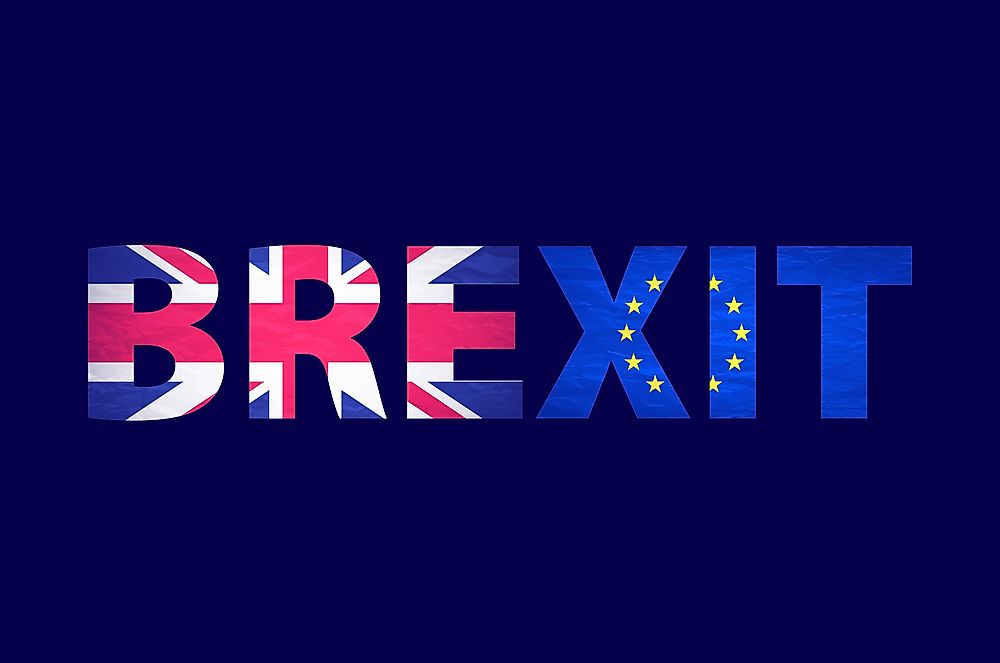What Is Brexit?

Brexit, a combination of “British” and “exit,” is the move to withdraw the United Kingdom from the European Union (EU). In the referendum held on June 23, 2016, approximately 51.9% of the electorate who participated voted for the UK to leave the European Union. The election reported a 72% voter’s turnout. On March 29, 2017, the parliament invoked Article 50 of the European Union Treaty officially beginning the withdrawal process.
When Did the UK Join the EU?
The European Union (then known as the European Communities) was founded by the signing of the Treaty of Paris in 1951 by Belgium, France, Italy, Luxembourg, the Netherlands, and West Germany. The United Kingdom applied to join the European Communities in 1963 and 1967, but were vetoed by French President de Gaulle. After President de Gaulle surrendered his seat in 1969, the United Kingdom successfully applied and the Treaty of Accession was signed by UK Prime Minister Heath in January 1972. The European Communities Act 1972 was passed by the UK Parliament in October 1972, and the United Kingdom joined the European community officially on January 1, 1973, along with Ireland and Denmark. In 1993, the Copenhagen Criteria was created to outline the criteria countries need to meet to join the EU.
When Did the EU Brexit Campaign Begin?
The opposition labor party contested in the 1974 general elections with the promise to renegotiate the United Kingdom’s terms of European Communities membership plus a referendum on European Communities membership. After their victory, a national referendum was held in 1975, but despite the crucial division in the labor party, all the other parties and the press supported the EC membership. On June 5, 1975, approximately 67.2% of the British electorates voted to stay in the European Communities. The referendum-party under Sir Goldsmith competed in the general elections of 1997 on a pledge of providing a referendum to discuss the nature of the relationship between the UK and the EU, but they lost.
Brexit Referendum
The referendum was originally called by Prime Minister David Cameron. Although he had previously rejected the idea of a Brexit referendum in as early as 2012, under pressure from other government officials, Cameron announced in January 2013 that a referendum would take place by the end of 2017. Cameron, the leader of the Conservative Party, wanted the UK to remain part of a reformed European Union with re-negotiated membership terms. Cameron announced his resignation on June 24, 2016, the day the referendum results were announced.
Brexit Referendum Results
On June 23, 2016, a referendum was held to decide the fate of the United Kingdom as a member of the European Union. The referendum, titled “United Kingdom European Union membership referendum” asked, “Should the United Kingdom remain a member of the European Union or leave the European Union?” With 51.9% in favor of withdrawing from the EU, Article 50 of the Treaty on the European Union was invoked on March 29, 2017, beginning a two-year long withdrawal process popularly known as Brexit. This has made the UK the first country to leave the EU.
Due to the extremely close result (51.89% Leave vs. 48.11% Remain), a petition was signed by over 4 million people calling for a second referendum. The idea ultimately rejected by the government on July 9, 2016. On July 13, 2016, Theresa May replaced Cameron as the leader of the Conservative Party and the UK Prime Minister. Under May, the UK government invoked Article 50 of the European Union Treaty officially beginning the withdrawal process of the UK from the EU.
Brexit Date
Brexit was set to take place on March 29, 2019, two years to the day after Article 50 was invoked. As the EU Council and UK government were unable to come to an agreement about the withdrawal, the deadline was extended to October 31, 2019. With her Brexit deal defeated numerous times in Parliament, May announced her resignation on May 24, 2019, which goes into effect on June 7, 2019. The uncertainty around Brexit has had various impacts on the British economy. International trade has been reduced while the UK inflation rate has risen. In the long term, economists are predicting a GDP loss as high at 4.5%. Brexit has also left uncertainties about the future of the UK agricultural industry.











